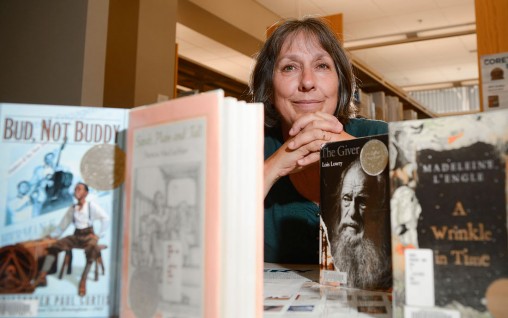
Stephanie Bange, director of the Educational Resource Center, will help select the winner of the Newbery Medal, honoring the best in children’s literature.
Not many adults love children’s literature quite like Stephanie Bange.
It’s a love that can be traced to her childhood, when Bange was living with her family on a military base on the shores of Guam, a small tropical island in the Pacific Ocean. Having little to do and nowhere to go, she took to the comfort of literature.
“I would read whatever I could — picture books, chapter books or really anything I could get my hands on,” said Bange. “The base we stayed at had so few books, at one point I even began reading nutrition labels on cereal boxes for fun.”
But above all, Bange developed a soft spot for books targeting younger audiences.
Now a full-grown reader and the director of Wright State University’s Educational Resource Center, Bange’s enthusiasm for children’s literature has only grown.
Recently, she was elected a key member of the Newbery Award committee.
Named after the 18th century British bookseller John Newbery, the Newbery Medal is awarded to authors of distinguished children’s literature. Books such as “The Giver” by Lois Lowry, “A Wrinkle in Time” by Madeleine L’Engle and “Holes” by Louis Sachar are among the prestigious ranks of Newbery Medal winners.
“When I found out I won the election and made it on to the committee, I was thrilled,” said Bange.
Bange said the committee is incredibly exclusive. She is one of its 15 diverse members, all of whom were either elected or appointed based on career experience in children’s literature. Each member comes from a unique background with a different perspective.
The committee’s goal is to decide which book authored in 2014 is deserving of the Newbery Medal and should become an instant classic.
“I have a reading list of over 300 children’s books,” said Bange. “Over the next few months, I’ll have to get through them all and decide which ones stand out the most.”
Bange has until January to pick her cream of the crop before the Newbery committee convenes to decide which among each member’s top seven books meets the Newbery criteria. And the committee meeting will be much more than a mere book club gathering — intense debates and discussions are sure to ensue.
According to the Newbery website, committee members must consider the interpretation of the book’s theme or concept; the presentation of information vis-à-vis accuracy, clarity and organization; development of a plot; delineation of characters and setting; and the presence of any exemplary style.
“I try to examine all genres differently,” said Bange. “If a book is a work of fiction, you’re looking at the story arc, plot, character development, setting, among other things. For nonfiction, you need to pay attention to accuracy, chronology and how interesting the author makes his or her subject.”
On Feb. 2, 2015, the next winner of the Newbery Award will be declared.
“By being on this committee, I really believe I can benefit Wright State,” said Bange. “I have been sent hundreds of books to consider for the award. Even after the Newbery Award has been given to one, I still get to keep all of them. That means the best of the best will remain in the ERC’s collection.”
In the future, Bange says she plans to spearhead a mock Newbery Award committee among Dayton-area librarians and children’s book enthusiasts.

 Walking through open doors
Walking through open doors  Adventures await
Adventures await  Wright State to expand nursing facilities to meet workforce needs and prepare more graduates for in-demand careers
Wright State to expand nursing facilities to meet workforce needs and prepare more graduates for in-demand careers  Wright State student-athletes make a lasting impact on local family with more to come
Wright State student-athletes make a lasting impact on local family with more to come  Wright State names Rajneesh Suri dean of Raj Soin College of Business
Wright State names Rajneesh Suri dean of Raj Soin College of Business 